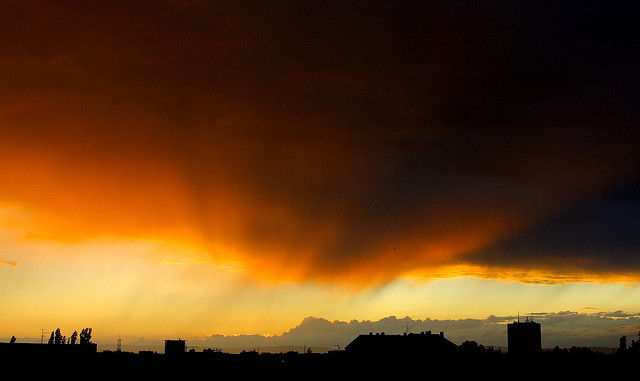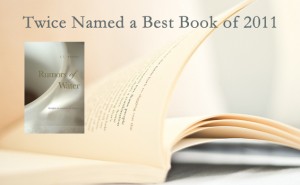As a boy, I lived a spell in East Texas. Somewhere on the edge of the urban sprawl, my sister and I ran barefooted down dirt roads, sat under the shade of mesquite groves, and tromped through fields of briars to the neighbor-lady’s house with all the aquariums. We were home on the range and my parents let us roam free, at least mostly free.
There was a standing rule in the Haines family: don’t be caught out in an East Texas lightning storm.
The rule was the direct outgrowth of some urban legend involving an old man from Sherman, Texas, I think. He’d been struck by lightning something close to a half-dozen times, so much, in fact, that he’d become some kind of human lightning rod. It was said that he described the moments before a lightning strike with electrifying detail: static charged hair stands on end, metal zippers begin to crackle, and the smell of ozone becomes so intense that it’s near euphoric.
This story had never been independently verified — at six I was without scoop-worthy fact-checking sources. Nonetheless, my sister and I ran like wild animals at the first signs of storm. The piling up of clouds, the smell of splitting ions, the low rumble in the far-off country — those rumors sent us tearing for the house where our parents would be waiting on the back porch. Sometimes we’d all sit together and watch the storm build to a crescendo, the wall of rain advancing from the west, lightning tendrils touching nearby fields.
As children, we were carefully trained to recognize the conditions for a coming storm. Sometimes I wish I had the same keen ability to recognize when conditions were just right for a good brainstorm.
“There is nothing in this world that does not have a decisive moment, ” Henri Cartier-Bresson would publish in his 1952 book of images. Of photography, he would say that the art was “the simultaneous recognition, in a fraction of a second, of the significance of an event as well as of a precise organization of forms which give that event its proper expression.”
Bresson captures this thought in one of his most famous images. A man is caught in mid-leap over a rain puddle and, having made a gross miscalculation, will momentarily be the owner of one pair of soggy trousers. The decisive moment: the leap. The inevitable outcome: a trip to the laundry.
Bresson was a master at capturing the decisive moment. Perhaps that’s why his work is still revered today.
Recognizing creatively decisive moments is more difficult than recognizing a coming thunderstorm. How often do I feel words rising, view a moving piece of art, see a stunning act of kindness at the farmer’s market, and fail to record its beauty (either with my pen or my mind’s eye)? How often do I miss the prompts that are happening all around me?
It is the artist’s job to make the most of these personal decisive moments. And if we do, perhaps we can be the ones who capture lightning in a bottle.
Tweetspeak’s August Rain Project.
Would you like to join with us in capturing your own decisive moment this week? This month’s found poem theme at Tweetspeak is Rain, and we’re using book spines as the prompt. In fact, today’s post was inspired by the book spine of Annie Dillard’s An American Childhood (along with my love for Henri Cartier-Bresson’s photography). We’d love you to join with is. How do you participate?
1. This month, we will take our cues from book spines (see Glynn’s piece for more information). Look through your personal collection, the aisles at your local bookstore, or your neighbor’s bookcase and grab a few titles.
2. Arrange a poem completely from words on book spines, or use pieces of the titles to create your own found poem. Make sure your poems touch on themes of rain OR water.
3. Tweet your poems (and pictures of the book spines) to us. Add a #tsrain hashtag so we can find it and maybe share it with the world.
4. If you aren’t a twitter user, leave your found poem here in the comment box (we’ll use our mind’s eye to imagine your book spines).
5. Each week we’ll share a few of the poems. At the end of the month, we’ll choose a winning poem and ask the winner to record his or her poem to be featured in one of our upcoming Weekly Top 10 Poetic Picks.
Last week we received some great rain themed book spine poetry.
In “Salt Water Amnesia” Maureen Doallas plays with epic imagery and water themes. She writes:
A thousand vessels
jam the city in which I love you.
Tell me
I have tasted the apple.
Tell me
the captain lands in paradise
where currents meet.
In “The World As I See It” Casee deals with issues of faith and humanity. She writes:
Us, gypsies, wanderers of the world.
The sacred origins of profound things,
the things they carried, forgotten.
Magical beginnings, enchanted lives, separated.
Seeking Utopia with the praise of folly.
We exchange the living bible for fun with hand shadows.
Like water for chocolate, the God of small things
dispatches, from the war room, letters from the earth.
Adventures in gentle discipline for an ageless body, timeless mind.
For us, the birth of tragedy.
Living on earth, the weeping woman, must learn
the art of racing in the rain, struggling to touch the earth.
Religions of the world, searching for God knows what,
desire to be the know it all.
The paradox of plenty, the death of common sense.
The Alchemist, the reminding salt,
Crossing the water, piece by piece,
Nourishing traditions,
Turning to one another: simple conversations to restore hope.
You already know what to do.
Eat, pray, love.
Thanks to everyone who submitted their own piece of book spine poetry last week. Now, go create a new work and come back here to rain it on us!
Photo (top) by fluffisch, Creative Commons via Flickr. Post by Seth Haines.
______________________
- Become a Better Writer: Fly Fishing Artist Date - June 6, 2014
- No Cat Poetry for Fierce Dog Lovers - November 22, 2013
- Exploring Poetry: Penning a Ghazal - October 18, 2013


Maureen Doallas says
That sky looks as though it has been torched. What color!
Irresistible prompt. Thank you for mentioning my poem, Seth.
Seth Haines says
It was a good one. I hope you work on something for this week!
Monica Sharman says
A master chef took
a kitchen torch to the sky
making upside-down creme
brulee dripping down
caramel precipitation.
Seth Haines says
I love the imagery in this, Monica. I know exactly what you are describing and it is lovely. Was the picture above a bit of a prompt?
Monica Sharman says
Yes, the picture, and Maureen’s comment!
Ann Kroeker says
Love the description at the beginning, wow, what a sense of place! Reminds me of a scene in a Scott Russell Sanders essay about staying on a porch during a strong storm with the same level of sensory details; another scene of his tells of lightning striking a tree while his daddy held a young SRS in his arms.
Are you sure you’ve never been struck by lightning? Your writing (forgive me) electrifies.
Seth Haines says
Thanks, Ann. As you know… puns are welcomed here! Now that you commented… maybe you could jump in? Maybe you could share what storms do up there in hoosier country (and is hoosier a proper noun?)?
Donna says
The Decisive Moment. Powerful to consider. I had to chuckle a the urban legends as I realize they many ways we parents sometimes borrow from them to keep our children safe and alert, as in the case of neighbors who told their little boys that there were bobcats in the woods behind their new apartment home. Poor boys had more than a little bit of fear about bobcats but they also never got lost in the woods.
I dipped into my kindle library today as my own titles were just not doing it for me as the spine poetry goes…. so here is my poem, with a few hints of water so there must have been rain somewhere, yes? (and by the way it just started to rain as I write this, so that must count for something)
invisible heroes
whisper
rumors of water
in high places
where
the oceanic mind
is
always watching
Seth Haines says
Kindle library? GREAT idea. And you must also be a rain summoner (see last week’s rain piece).
Great spine… ahem… Kindle poem. I like how you conjur images of another world. A spiritual one, no?
Donna says
ahhhh – yes. 😉 thank you.
Maureen Doallas says
I’ve posted a few new book spine poems here:
http://writingwithoutpaper.blogspot.com/2012/08/flood-song-and-other-poems.html
Seth Haines says
Maureen,
Jumped over to you blog to blog to check out your poems. I REALLY like flood song. Great stuff. Keep ’em coming!
Glynn says
My poem: http://faithfictionfriends.blogspot.com/2012/08/east-wind-rain.html
Seth Haines says
I’m pretty sure you just upped the ante, my friend. Wow.
Monica Sharman says
Seems like this project would be a lot easier if I could use song titles instead of book titles. But I’ll stick to the guidelines. 🙂
Donna says
LOL! Yes… I am smiling 🙂 bc I considered doing the same thing!
Seth Haines says
What if I threw you both a bone and gave you a song title put in the mix next week? I have the perfect song…
Donna says
Yippity! Throw it! 🙂 🙂 woof
Rosanne Osborne says
And here’s a poem mined from my shelves:
http://poetryhawk.blogspot.com/2012/08/mississippi.html
Seth Haines says
“These rains, intruders in the dust,
bring mosquitos to the mansion…”
I’ve seen this down in the deep south, just not in MY mansion! 🙂
L. L. Barkat says
Seth, this is so beautiful. Deeply artful.
And I love the ending of that last poem. Our community poets are really raising the bar on this Book Spine Poetry! 🙂
Seth Haines says
It fun to watch what’s coming out of this. This community is truly incredible!
Rosanne Osborne says
Mining the Warren canon.
http://poetryhawk.blogspot.com/2012/08/promise.html